7 min read
What It Means To Be A Hospice Volunteer At Gulfside Healthcare Services.
By: Linda Ward on October 26, 2020 at 9:00 AM
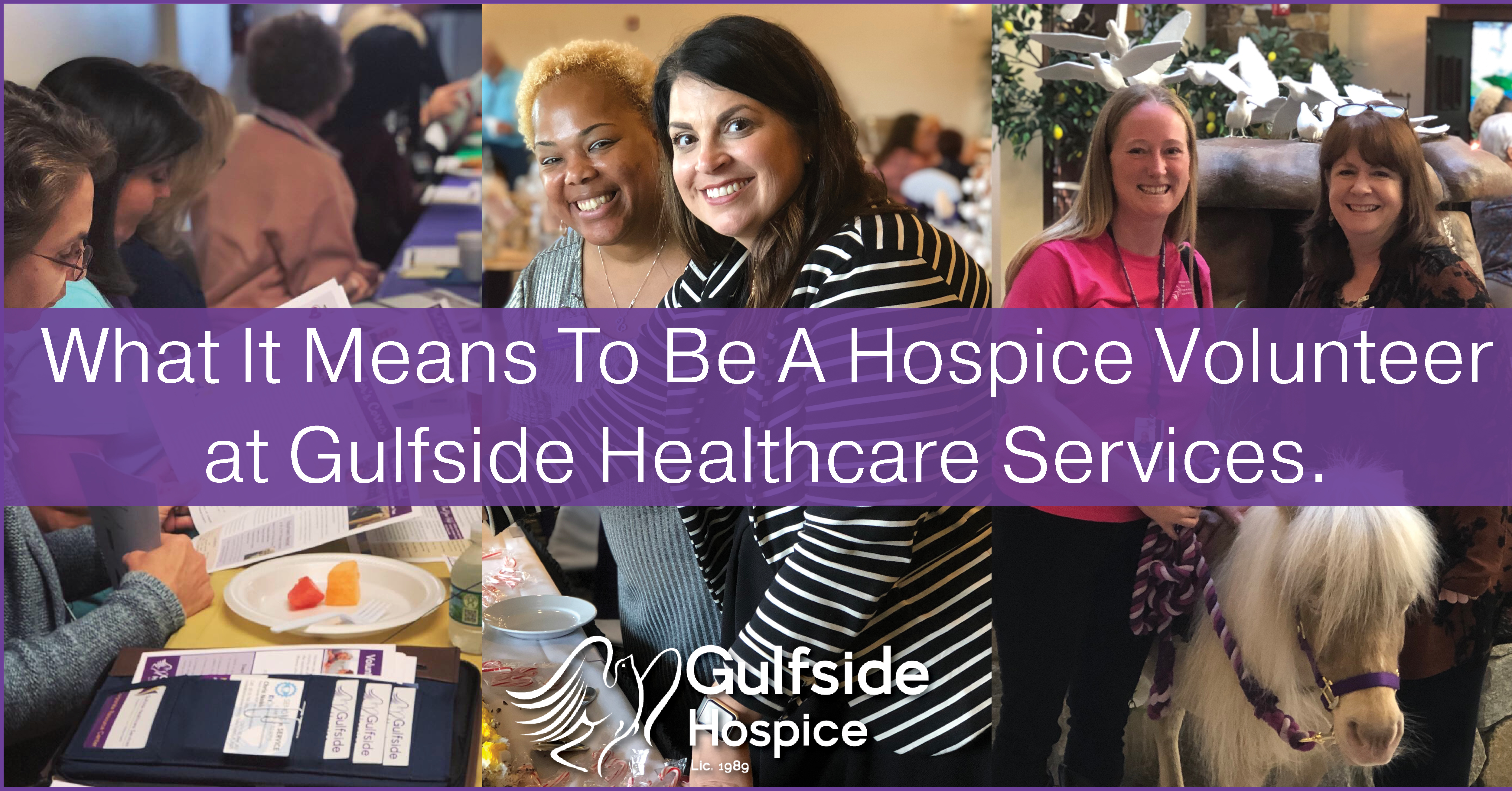
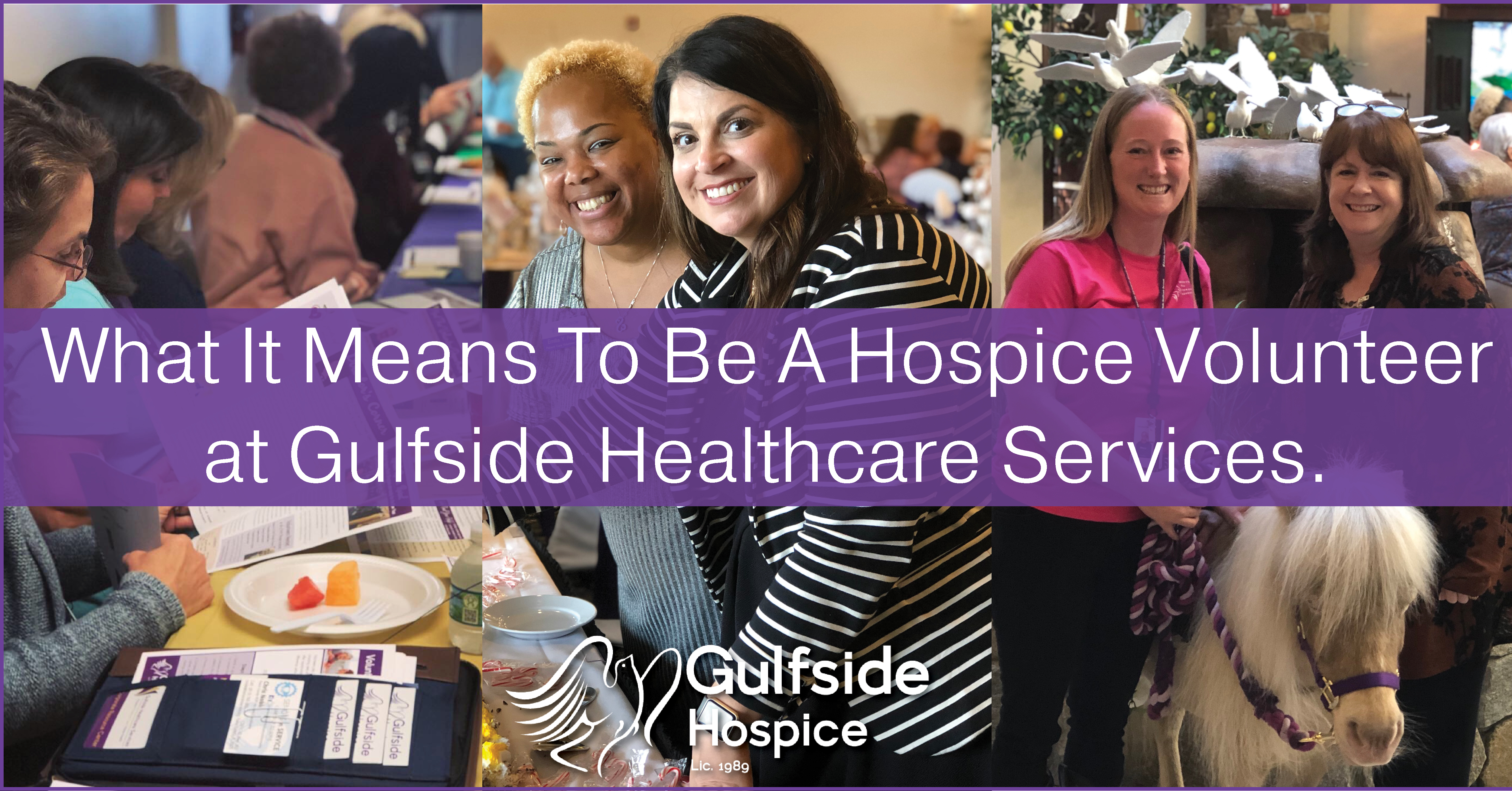
Compassion. It is a word that we use in our vocabulary every day and something that the majority of us strive to have. The team at Gulfside is no different. From nurses to doctors and social workers, the goal is to be compassionate and towards every patient or family we see. After all, that is part of the Gulfside's values and mission statement. So, the Gulfside team always makes sure they take the time to listen and provide compassionate care for each patient. What is truly remarkable is when a stranger decides to give up their time to help us and demonstrates compassion by becoming a Gulfside Hospice Patient Care Volunteer.
Hospice volunteers play a vital role at Gulfside. Without their compassion and help, it would be difficult to do what we do every day. Hospice volunteers come from all different walks of life — from caregivers to college students, nurses, and just members of the community we call home, Pasco County. Which means that you could also be a volunteer, and this blog post will explain what it truly means and takes to be a Patient Care Volunteer . You can learn more about the duties, requirements, and benefits by continuing to read. Then, it is up to you to decide how to show some compassion and help our team on our mission.
What are the benefits of being a Hospice Patient Care Volunteer?
For patients and families, hospice volunteers are there to provide an extra level of comfort, extra time of companionship, and another ear to listen to the heartfelt stories. For the care team, volunteers are an extra pair of hands in the kitchen, another smile to greet customers at the Thrift Shoppes, and extra visitor to check in and chat with patients.
For the volunteers themselves, they also get to experience some benefits. Volunteering allows the volunteer to feel like they belong to something. According to Senior Corps Report, approximately 82% of adults reported that volunteering helps them feel less lonely. Other studies have shown the benefits of consistent socializing include better brain function, and lower risk for depression and anxiety. People also tend to build stronger bonds with others when they are working together, so volunteering is a great way to find new friends and acquaintances.
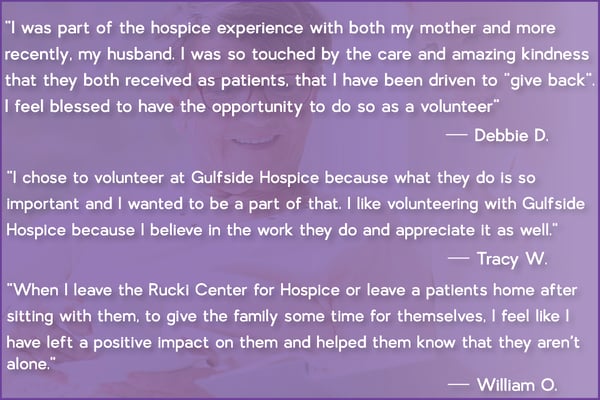
How do volunteers help the patient, caregivers, and family?
Becoming a caregiver for a loved one or making the decision with your loved one to receive hospice care can be a stressful and emotional for people. Nobody is ever prepared for the change in roles and switching from a wife, husband, daughter, or son and being the primary caregiver. According to the National Caregiving Alliance & AARP, family caregivers spend an average of 24.4 hours per week providing care. Nearly 1 in 4 caregivers spend 41 hours or more per week providing care for a loved one. In addition to this, the National Caregiving Alliance has found that the more hours a caregiver spends providing care, the more likely for that caregiver to be put in a high-burden care situation and begin to feel burnt out.
That’s where volunteers come in. By joining the Gulfside team and becoming a hospice volunteer, you can help families and patients have some relief from the hustle and bustle of receiving or providing care.
What can I do as a hospice volunteer?
The Gulfside Hospice volunteer department will work with anyone interested in volunteering to find the best program or department that suits their abilities, skills and preferences. Volunteers can choose to support with patients and families in a variety of ways, and many are part of a specialized program at Gulfside called “Comfort Connections.” Volunteer opportunities in the Comfort Connections program consist of things like Pet Peace of Mind®, We Honor Veterans, and Seeds of Solace. To read more about Comfort Connections and the individual programs, click here.
In addition to Comfort Connections, there are many other ways you can help give back to your community and help our team:
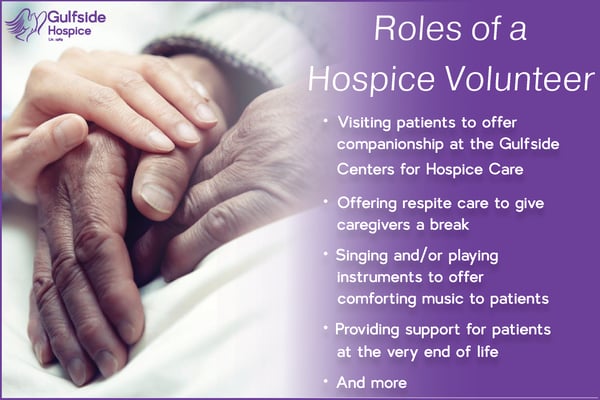
So, what does it mean to be a Patient Care Volunteer?
In the introduction of this blog post, the word compassion was mentioned, but what does it mean to be compassionate and take on the responsibilities of being a member of our team?
To answer this question, we talked to Gulfside’s Patient Care Volunteer Manager, Emilia Peguero, and asked her a few questions about what it means to be a Patient Care Volunteer.
Here is what Emilia had to say:
Q: What has been your favorite volunteer activity you have put together?
A: The most exciting thing that we have done is the virtual DIYs and Appreciation Meetings. It was a joy for me to see the volunteers because we had missed them so much. To see their smiling faces brought tears to my eyes. We are all going through something so unimaginable that has caused us to realize that life is too short and we have enjoy what is around us, and that is family, friends and others.
Q: What do you look for when recruiting new patient care volunteers?
A: People wanting to give back because they feel it in their heart, because they experience it and want to show others who are going through it that they are not alone. We want people who are compassionate, giving, understanding, and most importantly, supportive of what our mission states, which is to provide compassionate care and support to those in the end of life and their family members.
Q: Can anybody be a Patient Care Volunteer or are there some requirements?
A: There are a few recruitments for becoming a Patient Care Volunteer, some of which are listed below. If anybody has any questions in regards to these requirements or would like more information about the onboarding process for Patient Care Volunteers, please feel free to contact the Volunteer Department at 727-992-7973 or email volunteer.managers@gulfside.org.
- Online or Paper Volunteer Application
- Meet and greet with Volunteer Coordinators
- Tuberculosis Skin Test Screening
- Online Education Courses
- Background and Fingerprint Check
Q: How are Patient Care volunteers giving back during the pandemic?
A: Many activities can be done virtually while still helping patients and their families, and giving back to the organization.
Due to the current pandemic, the Volunteer Department has transitioned many of the in-person meetings to remote methods such as Zoom and other virtual video conferencing. This has been successful, and it has actually increased communication and engagement.
Examples include:
- Online DIY Card Making for our patients and their families
- Online Social Meetings to connect with other volunteers
- Online Trainings and Q&A sessions
- Remote On-Boarding
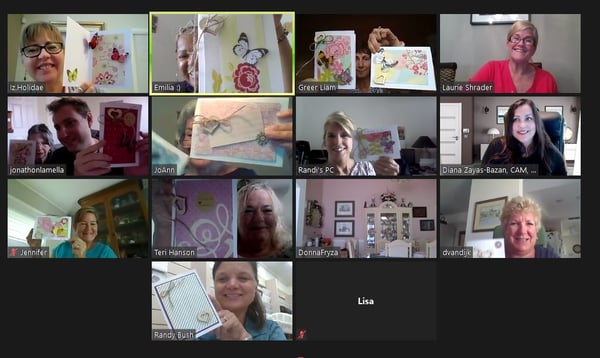
Q: What precautions is Gulfside taking?
A: The safety of Gulfside Healthcare Services employees, volunteers, patients, and families is always a top priority. At Gulfside, we are taking precautions during the COVID-19 pandemic. We have a dedicated Infection Prevention Program and staying on top of CDC recommendations.
All volunteers receive infection prevention training, necessary personal protective equipment as needed, and hand hygiene supplies. Visits and activities can be adjusted to meet the comfort level of individual volunteers.
How do I learn more about becoming a volunteer?
If you think becoming a hospice volunteer might be right for you, we’d love the chance to talk with you and explain the application and onboarding process.
To learn more about volunteering at Gulfside Healthcare Services and becoming a Patient Care Volunteer, click the button below to visit our website. From there, you can download the application, or even complete the contact form to request more information. You can also contact Gulfside’s Bereavement Department by calling 727-845-5707.
Related Posts
How To Begin The Conversation About Hospice
There are various tools, strategies, and resources can help first-time family caregivers begin the...
Guide To Receiving Compassionate Care In 2022
What is the most important part of the end-of-life care process? Compassion. The National Institute...
How To Start The Hospice Process
Hospice. An intimidating word to hear at first, and one that leads to a new chapter life. If you...


